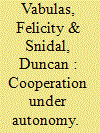|
|
|
Sort Order |
|
|
|
Items / Page
|
|
|
|
|
|
|
| Srl | Item |
| 1 |
ID:
180205


|
|
|
|
|
| Summary/Abstract |
Informal intergovernmental organizations (IIGOs) such as the Proliferation Security Initiative and G20 increasingly play a central role in governing international relations. IIGOs are based on recurrent meetings among high-level state representatives but are not legalized through a treaty and have no permanent secretariat. They allow states to organize internationally without sacrificing autonomy to a supranational entity. We present the IIGO 2.0 dataset, the most comprehensive compilation of these institutions to date, and illustrate the significance of IIGOs through several key empirical findings. First, while the creation of formal IGOs (FIGOs) has plateaued, states are increasingly creating IIGOs to address critical global issues. Second, states disproportionately use IIGOs for high politics issue areas including peace, security, and political agenda-setting which challenges conventional wisdom that IGOs (intergovernmental organizations) are less relevant in the security realm. Third, IIGOs are remarkably durable. Although states could readily formalize or abandon IIGOs, they generally organize cooperation informally for long periods. Finally, IIGOs are typically smaller than FIGOs and this design choice is increasingly used by states of all levels of development, power, and region. The availability of the IIGO 2.0 dataset will promote further analysis on the growing diversity of international institutions.
|
|
|
|
|
|
|
|
|
|
|
|
|
|
|
|
| 2 |
ID:
165440


|
|
|
|
|
| Summary/Abstract |
Why do intergovernmental organizations (IGOs) that espouse democratic commitments suspend the membership of some states that backslide on those commitments, while leaving that of others intact? We argue that a combination of geopolitical factors and institutional rules help explain this inconsistent pattern. Remaining member states insulate geopolitically important states—particularly those with large endowments of oil resources—from suspension. Institutional factors, such as voting rules and the size of the IGO, create veto points that reduce suspensions. Using an original global data set of IGO suspensions and charter commitments from 1980 to 2010, we find strong support for our argument. We test a key assumption of existing scholarship that claims IGOs serve as credible-commitment devices for political reform and democratization. We show that once a state becomes an IGO member, it can often remain in the IGO even after violating its democratic commitments.
|
|
|
|
|
|
|
|
|
|
|
|
|
|
|
|
| 3 |
ID:
165436


|
|
|
|
|
| Summary/Abstract |
Newspapers print alarming headlines when foreign governments hire U.S.-based lobbyists to promote their interests in Washington D.C. But does foreign lobbying systematically affect U.S. foreign policy? We provide an analysis of the influence of foreign lobbying on one important component of U.S. foreign policy: the evaluation of human rights practices abroad. U.S. human rights ratings can have a large impact on American foreign policy. They affect foreign aid, sanctions, and trade. Thus, we expect that many countries seek to tilt State Department Country Reports on Human Rights in their favor through information they provide to U.S.-based lobbyists. Our statistical analysis of these State Department reports and lobbying data from the Foreign Agent Registration Act between 1976‒2012 shows that, holding other factors equal, more foreign lobbying leads to more favorable U.S. human rights reports—when compared to both previous reports and Amnesty International reports. Furthermore, our findings contribute to the growing literature on performance indicators like human rights ratings by highlighting the politics of how those ratings are generated.
|
|
|
|
|
|
|
|
|
|
|
|
|
|
|
|
|
|
|
|
|